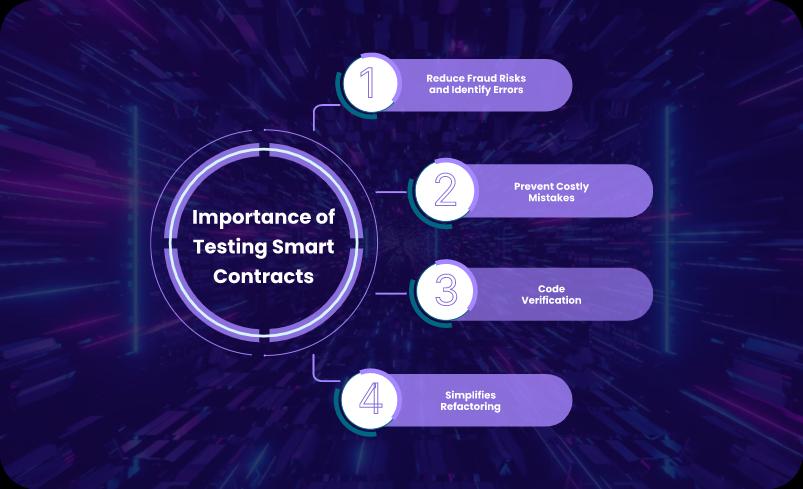A Guide to Properly Testing Your Smart Contracts on the Blockchain
A single mistake in a blockchain environment could cost you all of your funds or, even worse, the funds of your users. Testing smart contracts is a complex process that requires knowledge and skills, so it is a common space for mistakes many developers just know of.
This guide will help you build robust applications on blockchain by letting you learn how to test smart contracts that guarantee your application works exactly as it is expected to. Here we will cover the following topics:
- What smart contract testing means;
- The importance of smart contract testing;
- Types of testing;
- Tools and libraries you should know.
What is Smart Contract Testing?
Smart contract testing is a process that performs detailed analysis and evaluation of a smart contract to test and verify the quality of its source code throughout the development cycle.
Testing smart contracts not only ensures the final product world as intended but also makes it easier to find bugs and vulnerabilities, reducing the possibility of errors and hacker attacks.
Book a Free Call!
Learn more about our expertise and get a detailed approach and solution for your specific case
Book a callImportance of Testing Smart Contracts
Most smart contracts handle high-value transactions. Even if your smart contract belongs to a small passion project, it may include people using it to trade millions worth of assets. Minor issues and flaws in their code could lead to large sums of money or valuable assets being stolen or lost. Smart-contract testing allows you to identify vulnerabilities before the launch of the software so you can prevent significant losses.
Since smart contracts are immutable, your dev team won’t be able to fix the code after releasing them. So if the issue was identified after the release, developers would need to disable a smart contract and write a new one to fix the mistake.
For instance, Rubixi, one of the most well-known ponzi games, was launched with a naming error, which made it possible for anyone to set themselves as the contract owner. As a result, the funds within the game contract could be withdrawn at any time by the “self-named owner,” so large sums can be easily stolen. And the error was noticed only after the release of the game, so the dev team did not have an opportunity to fix the mistake.

Key reasons for testing smart contracts include the following:
1. Reduce Fraud Risks and Identify Errors
Smart contracts often work with high-value assets, especially when discussing decentralized finance (DeFi) and assets like non-fungible tokens (NFTs). Therefore, any minor errors in the code can and will lead to massive, irrecoverable losses for clients. Testing smart contracts allow for the exposure of errors in smart contract code, reducing the security risk before the release.
2. Prevent Costly Mistakes
Smart contracts are immutable by default. While traditional developers will be able to fix issues after the deployment, it doesn’t work with smart contracts. Blockchain ledgers don’t leave room for fixing mistakes once a smart contract is live. So if you find any security flaws after the release, you will need to disable them, write a new one and relaunch smart contracts, which can cost you extra millions.
3. Code Verification
Testing smart contracts allow you to validate behaviors within your code. This assures you that the code performs exactly like it is expected without any unwanted or unpredictable issues arising.
Tests also ensure that newly added pieces of code do not have unintended side effects. And when the new logic is added, comprehensive testing guarantees you have not broken any previous functionality.
4. Simplifies Refactoring
Quality testing also simplifies refactoring. As long as you make changes and tests seem to fail, they also offer an accurate sign of areas that must be addressed. This helps to save time in debugging. Your suit testing also helps to rule out many potential causes in case of an unexpected error.
Types of Smart Contract Testing
1. Functional Testing
Functional testing ensures the proper functionality of a smart contract while also assuring that each line of the code works as intended. Functional testing requires an understanding of how your smart contracts should work in certain conditions. Your development team will need to test each function by running computations with chosen values to compare the actual output with the expected one.
Functional testing is made up of three levels of testing, known as:
1.1. Unit Testing
Unit testing is made up of testing individual components in a smart contract for accuracy. Unit tests are simple and quick to run, and they also provide a clear overview of what went wrong if the test fails.
Even though unit tests are important for smart contracts, they are especially vital if you need to add new logic to the code. This way, you will be confident in the smart contract behavior.
Unit testing often requires creating assertions, which are simple, informal statements illustrating requirements for a smart contract. Then you can use unit testing to verify each assertion to see if it holds true under execution.
For example, common smart contract assertions are:
- Only the admin is responsible for pausing the contract
- Users cant mint tokens
- Transaction is not executed on errors
1.2. Integration Testing
Integration testing is the second layer in the testing hierarchy. It involves testing individual components of the smart contract being tested together.
This method is used to identify errors that can appear from interactions between different components within the contract or/and across multiple contracts. This method is essential in the case of complex smart contracts handling a vast range of functions that interface with other contracts.
1.3. System Testing
System testing estimates the smart contract as a fully integrated product to see if it works as intended based on inner technical requirements. This process works like checking the entire smart contract working process from a user’s point of view.
Pro Tip: One of the most efficient ways to perform this testing is by deploying it on a production-like environment, like a testnet or development network. This way, you will let end-users perform trial runs so they can report any issues or overall functionality.
Subscribe for Updates!
New product features, the latest in technology, solutions and updates.
2. Static/Dynamic Analysis
The second type of smart contract security testing is the static analysis and dynamic analysis, two automated testing methods used to estimate the security qualities of smart contracts. However, both techniques use different approaches to detect errors.
2.1. Static Analysis
Static analysis checks the code source or bytecode of your smart contract before execution. Therefore, dev teams are able to debug the code without running the program. Static analyzers allow developers to quickly find common vulnerabilities and achieve compliance with the latest practices.
A code audit refers to a detailed evaluation of a smart contract’s code to discover possible failure points, security flaws, as well as poor development methods. Even though code audits can be done automatically, here we talk only about human-aided code analysis.
Static analysis also includes code audits that require specific knowledge since specialists should know how attackers could potentially reach sensitive data and assets within the software while also knowing what vectors to look for.
2.2. Dynamic Analysis
In contrast to static analysis, dynamic techniques require your team to execute the smart contract in a runtime environment so it can detect issues in the code. This type of testing checks the smart contract behavior during execution to generate a detailed report of vulnerabilities and property violations found during the process.
Fuzzing is a good example of a dynamic analysis technique. This method involves feeding the smart contract with invalid and malformed data to monitor how the code responds to these inputs.
Smart contracts rely on data inputs by users to be self-executed. And if it is expected that users will provide correct inputs, in most cases, it isn’t true. If the contract wasn’t tested this way, sending incorrect data in real conditions can cause resource leaks, crashes, or unintended code execution.
You May Also be Interested
Testing vs. Formal Verification
Testing is used to verify that a smart contract returns the expected output for some data inputs. However, testing won’t prove the same for inputs not used during tests. This means testing smart contracts won’t ensure “functional correctness,” so it won’t guarantee that your program works as intended for all sets of input values and in all conditions.
This makes developers add formal verification into the testing process to increase the correctness of smart contracts. Formal verification involves formal methods, which are mathematically rigorous techniques used to specify and verify the program.
Even though some teams forget about adding formal verification into the process, it is one of the most critical steps in checking smart contract functionality. That is because it helps developers formally test assumptions relating to smart contracts.
This is achieved through developing formal specifications describing a smart contract’s properties and ensuring that a formal model of the program matches the specification. This method boosts confidence that your smart contract will perform only those functions as defined in its business logic.
Tools and Libraries for Testing Smart Contracts
Unit Testing Tools
Solidity Coverage
It is designed to hint to developers about the way code of a smart contract behaves during execution, identifying vulnerabilities otherwise not covered by the scope of a test.
Waffle
Waffle is a framework used for complex smart contracts and testing (based on ethers.js).
OpenZeppelin Test Helpers
It is an assertion library for Ethereum smart contract testing that ensures your smart contracts work as suggested.
Truffle
It is an automated testing framework that makes it easy and effective to test your programs. The framework allows developers to write simple and manageable tests in two different ways:
Brownie Unit Testing Framework
Brownie uses Pytest, which is a feature-rich test framework allowing developers to write small tests using minimal code, making it easily scalable for large projects and highly extendable.
Etheno
If you are wondering how to test Ethereum smart contracts, Etheno is the way to go. It is an all-in-one Ethereum testing tool containing a JSON RPC multiplexer, an analysis tool wrapper, as well as a test integration tool. This tool reduces the complexity of setting up analysis tools like Manticore and Echidna on complex, multi-contract projects.
Static Analysis Tools
Slither
It is a Solidity static analysis framework to detect vulnerabilities, enhance code comprehension, and write custom analyses for smart contracts.
Solhint
Solhint is an open-source project that provides a linting utility for Solidity code.
Rattle
It is an EVM bytecode static analysis framework created for deployed smart contracts.
Dynamic Analysis Tools
Echidna
It is a fast smart contract fuzzer that lets you quickly find errors and vulnerabilities in smart contracts through property-based testing.
Harvey
It is an automated fuzzing tool for detecting property violations in your smart contract’s code.
Manticore
It is a dynamic symbolic execution framework used to analyze EVM bytecode.
Bug Bounty Platforms
Immunefi
It is a bug bounty platform designed especially for smart contracts and DeFi projects, allowing security researchers to review code, disclose vulnerabilities and make crypto projects safer.
HackerOne
It is a vulnerability coordination and bug bounty platform connecting businesses with penetration testers for cybersecurity researchers.
How Can Interexy Help?
Interexy is on the list of top blockchain development companies in Dubai, Miami, and London, according to Clutch. We offer well-thought-out smart contract development services, offering clients unique expertise, top-notch senior developers, and our background in the field for security and compliance with industry requirements.
Our blockchain development services make it easy for clients to either delegate the entire development and testing process or hire specialists to join their teams for cost efficiency. We have the largest staff of blockchain developers who know every minor point of the process to deliver secure, stable, and complex smart contracts and rigorous smart-contract testing.
Hire Developers
Let us choose the best specialist for you according to the project requirements so you can kick off the project within 5 business days!
Book a callFinal Thoughts
Once all tests are done, and your smart contracts are safe and correct, the next step is to deploy them to a real network and start interacting with them. If you have questions about our smart contract security testing process or require help with further steps, book a free call with one of our experts!
FAQS
Why is testing smart contracts important?
Testing smart contracts allows you to check that the code works as intended, is secure enough to be deployed, and will work in specific conditions. Acceptance test smart contracts to avoid expensive mistakes is one of the key reasons.
What are some common testing approaches for smart contracts?
Most common smart contract testing approaches include functional, integration, smart contract penetration testing and manual testing, as well as static and dynamic analysis.
Subscribe for Updates!
New product features, the latest in technology, solutions and updates.
Latest articles

The Ultimate Technical Guide to DAO Development
DAOs are built on blockchain technology, ensuring security, transparency, and immutability, providing a decentralized and trustless environment where stakeholders can participate in decision-making processes without intermediaries.

Machine Learning in Business: Opportunities & Best Practices
Machine Learning is a subset of Artificial Intelligence that involves using algorithms and statistical models to enable computers to improve their performance on tasks through experience.

Your Ultimate Roadmap to Compliant Blockchain Adoption
Ensuring regulatory compliance in blockchain adoption mitigates risks and fosters a secure, legal, and trustworthy environment for all stakeholders.








